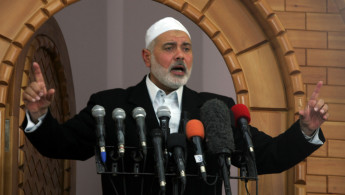Hamas meets Palestinian Authority's demands and dissolves Gaza authority
Hamas has dissolved its administration that runs the besieged Gaza Strip and is now agreeing to hold general elections, the movement announced on Sunday.
Hamas said in a statement on Sunday that it has dissolved its shadow government and that it will allow the so-called unity government to operate in Gaza. The group added that it woud agree to elections and enter talks with rival group Fatah.
Hamas' announcement means that the group has accepted key demands set by Palestinian President Mahmoud Abbas - whose presidency expired in 2009 - for ending the Fatah-Hamas split.
Among the demands are fresh elections in the West Bank and Gaza, which Hamas has boycotted due to it winning the last election that led to the split.
Abbas had also demanded the dissolving of a Gaza administrative committee and allowing an Abbas-led unity government, to assume responsibility in the besieged enclave.
The unity government was formed in the summer of 2014 during Israel's assault on the beseiged enclave, but has been inactive since.
Mahmoud Aloul, a senior Fatah official welcomed cautiously Hamas' position.
"If this is Hamas statement, then this is a positive sign," he told Reuters. "We in Fatah movement are ready to implement reconciliation."
Hamas on Tuesday said it was ready to reconciliation talks with the Fatah without preconditions.
Hamas had previously demanded that Abbas halt a series of measures taken against Gaza before sitting down to discuss a reconciliation deal.
However, in a statement made on Monday following a meeting with Egyptian officials in Cairo, the group said it was prepared to start talks with Fatah.
This comes after Hamas' leader Ismail Haniyeh landed in Cairo on Saturday for talks with Egyptian officials to end a siege on the Palestinian enclave of Gaza.
Gaza has effectively been under siege by Israel since Hamas came to power in 2007, but has received most of its electricity and fuel from Israel ever since, subsidised by the PA.
A similar blockade from the Egyptian side of the border has exasperated the problems for Gazans, with energy, food, fuel, medical supplies and building materials in short supply.
In April, the PA began to end energy payments, causing frequent power cuts in Gaza and severe pressure on regional hospitals.
The World Health Organisation warned in June that the blackouts threatened Gaza's health service provision and placed people's lives at real risk.





 Follow the Middle East's top stories in English at The New Arab on Google News
Follow the Middle East's top stories in English at The New Arab on Google News
![Israeli forces ordered bombed Gaza's Jabalia, ordering residents to leave [Getty]](/sites/default/files/styles/image_330x185/public/2176418030.jpeg?h=a5f2f23a&itok=_YGZaP1z)

